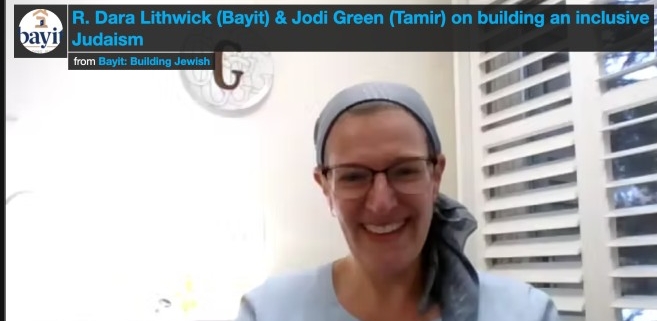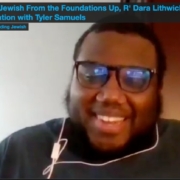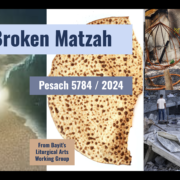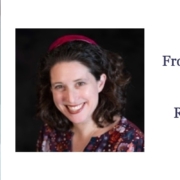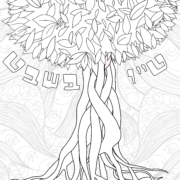Building an Inclusive Judaism: R. Dara Heidi interviews Jodi Green of Tamir
When we build Jewish, do we build with inclusion and accessibility in mind? Does our Bayit, our Jewish home, have ramp access or only stairs? What about our pews and prayers and prayerbooks? As part of Jewish Disability Awareness, Acceptance, and Inclusion Month (JDAIM), a worldwide effort by Jewish organizations to raise awareness and foster inclusion of people with disabilities, I interviewed fellow Ottawan Jodi Green, the coordinator of Judaic outreach and inclusion at Tamir, who just finished editing a draft of a new accessible Siddur (see below for attachments with examples, such as pictogram representations of the Hamotzi prayer over bread).
Tamir is a terrific organization in Ottawa, ON, that is dedicated to assisting people with developmental disabilities realize their potential in a supportive Jewish environment through opportunities for personal growth and community involvement. As Jodi says in the interview, inclusion is a Jewish imperative, and inclusion does not have to be scary or expensive. Inclusion is easy, it’s really about thinking how do we make sure that everyone can be a part of our community, right?
Now that is the kind of Bayit that I want to build.
Rabbi Dara Lithwick
Here is a glimpse of the siddur:
Kiddush Pictograms [pdf]
Kiddush Prayer Text [pdf]
Inclusion Siddur COVER [pdf]
And here’s a transcript of the video:
00:00:00.000 --> 00:00:14.000 (Rabbi Dara Lithwick) Whenever you're ready. Shalom, welcome, bonjour. Hi! My name is Rabbi Dara Lithwick. I use she/her pronouns, and I am so excited to be here today as part of the Bayit Builders blog, thinking about building Jewish and building a vibrant and exciting and dynamic Jewish future, an inclusive and accessible Jewish future and Jewish world. 00:00:27.000 --> 00:00:41.000 And I am so thrilled to be here today with Jodi Green, coordinator of Judaic outreach and inclusion at an amazing organization here in Ottawa called Tamir So i'm coming We're coming at you 00:00:41.000 --> 00:00:54.000 from Ottawa Ontario Canada which is on unceded Algonquin Anishinaabe territory, and we're both, I think, very grateful to be here and Jodi has been working on 00:00:54.000 --> 00:01:02.000 an amazing product - an accessible and inclusive siddur, which I think is sort of foundational 00:01:02.000 --> 00:01:11.000 for how we want to build Jewish. So Jodi, without further ado, tell us a bit about yourself, and about what you are working on. 00:01:11.000 --> 00:01:13.000 (Jodi Green) So. thank you so much, Rabbi Dara, for having me! Hi everyone! 00:01:13.000 --> 00:01:21.000 My name is Jodi Green. I use she/her pronouns, and for accessibility I am wearing a blue head scarf. 00:01:21.000 --> 00:01:27.000 I have black and red glasses, a blue sweater, and I have Caucasian skin. 00:01:27.000 --> 00:01:36.000 tone. And I am really excited to have this chat with you because this is a super exciting project, though I can't take full credit for it. 00:01:36.000 --> 00:01:49.000 Someone sent me an article about an organization in London, England, called J-Web that had put out this accessible siddur, and I started to investigate, and it was done by one of the Reform synagogues 00:01:49.000 --> 00:01:56.000 in London, and they put this amazing resource, and they made it free and available on the web. 00:01:56.000 --> 00:01:59.000 And so I, downloaded, started looking at it, and said, Hmm! 00:01:59.000 --> 00:02:05.000 I wonder if we could tweak this and make it unique and make it fit the traditions that are found in our Ottawa community. 00:02:05.000 --> 00:02:20.000 So, with the help of rabbis from many of the movements found here in Ottawa, as well as people who live with disabilities themselves, other community members, we have sort of adapted it to be as close as 00:02:20.000 --> 00:02:34.000 we can possibly get to sort of a one-stop shop resource for people with developmental disabilities who want to enhance and be able to engage more fully with the synagogue service. (Rabbi Dara Lithwick) That's amazing and talking about 00:02:34.000 --> 00:02:49.000 how we build Jewish and what we do I mean it seems like this work in terms of making Judaism more accessible and bringing Judaism to all of us has been something that as long as I've known you that you have been focused 00:02:49.000 --> 00:02:57.000 on, and sort of what in terms of your Judaism has called to you to do this work, and and to continue this work. 00:02:57.000 --> 00:03:02.000 (Jodi Green) So great questions so i've always worked at jewish communal service. That's my background that's my education. 00:03:02.000 --> 00:03:13.000 That's what I've done for the 20 years now (we won't talk about that), and it's really where my passion lies is making the Jewish community accessible to those who want to engage with us. 00:03:13.000 --> 00:03:19.000 I mean way back when I started with identity and affiliation work with 20 and thirty-somethings. 00:03:19.000 --> 00:03:32.000 And then i've been at Tamir now for 2 and a half years and 2 years, an organization supports adults and children with developmental disabilities and autism, to live their best lives and to live as independently with 00:03:32.000 --> 00:03:41.000 dignity as as they absolutely can, and looks to support them, and making choices about how they want to live their life. 00:03:41.000 --> 00:03:45.000 We are a Jewish organization, but we support people from all backgrounds and part, 00:03:45.000 --> 00:03:59.000 although we have a Jewish mandate, we also have a multicultural mandate, and as we support our Jewish participants to live their culture, we also support all of our participants to live and engage with their individual cultures 00:03:59.000 --> 00:04:08.000 And being Jewish is, I mean, I happen to have been born Jewish, and so don't know another way 00:04:08.000 --> 00:04:21.000 but I find it incredibly special and rewarding to be Jewish and to live a Jewish life; and if I can help our community to make sure that all Jews can practice and can live a Jewish life in ways that are meaningful to 00:04:21.000 --> 00:04:34.000 them, then, that's that's all I want is for Jews to be able to connect with our faith with our culture with our identity, whatever it means to them, and to be able to fully live and participate that way. (Rabbi Dara Lithwick) think that's so 00:04:34.000 --> 00:04:38.000 fundamental and so amazing and and right now, as we're recording this we're in the month of February, 00:04:38.000 --> 00:04:52.000 it's Jewish disabilities, awareness and inclusion month, which I know is something that also you are active in, and Tamir is active in, and sort of this I learned about this this month about this this project this month, and sort 00:04:52.000 --> 00:04:55.000 of how these, you know, have raising awareness in this way. 00:04:55.000 --> 00:05:01.000 Why is that so important? (Jodi Green) So, unfortunately we do live in a world where full inclusion has not yet been achieved. 00:05:01.000 --> 00:05:10.000 So we do have some work to do and especially the community that I work with mostly adults, with developmental disabilities. 00:05:10.000 --> 00:05:23.000 It's a population that still, unfortunately, lives a little bit on the outskirts of our community, and that we're still working towards inclusion - when somebody has trouble with communication, is non-verbal and might make noises it's 00:05:23.000 --> 00:05:32.000 it becomes, it becomes uncomfortable for for people who don't experience life that way, and so it makes inclusion a little bit harder. 00:05:32.000 --> 00:05:37.000 And so what we try to do is to create a universal world. 00:05:37.000 --> 00:05:51.000 I know that sounds like a very lofty goal. but if you, if you stop thinking of the world as having to adapt to other people, and thinking that the world should just allow everyone to to experience it in its own way, it creates a huge mindset 00:05:51.000 --> 00:05:58.000 shift right and no longer do you say: "Oh, this is a building we should add around", but a ramp becomes the defaults. 00:05:58.000 --> 00:06:11.000 Umm, I had an amazing experience- (Rabbi Dara Lithwick) So I'm so sorry i'm interrupting you, but, like as you're speaking, accessibility by design and really inclusion by design. (Jodi Green) Absolutely! So, 00:06:11.000 --> 00:06:16.000 here, I had a real life story. I had an experience a few weeks ago. I was going to the store and the entries to this, 00:06:16.000 --> 00:06:19.000 the door to the store is not kind of right at the street. 00:06:19.000 --> 00:06:27.000 You either have to come from the left or from the right, and on one side of the store is a staircase, and on the other side of the store is a ramp, and they both sort of go down and then you go to the 00:06:27.000 --> 00:06:39.000 front door. Okay, and we had just had a major snowfall and the shoveling and all wasn't, all completely done in the sidewalks, and all were a little bit cluttered but in front of the store they had only had time 00:06:39.000 --> 00:06:46.000 to shovel out one access point and they'd shoveled out the ramp, because everybody can use the ramp. 00:06:46.000 --> 00:06:50.000 Everybody can get to the store if the ramp is shoveled. 00:06:50.000 --> 00:06:58.000 Not everybody can get to the store if the stairs are shoveled, and that's what universal design is is making it accessible to everyone. 00:06:58.000 --> 00:07:04.000 Not having to adapt and accommodate for those who may move through the world differently. 00:07:04.000 --> 00:07:09.000 (Rabbi Dara Lithwick) I love that. I love thinking, you know, as we continue to build and innovate Jewishly. 00:07:09.000 --> 00:07:19.000 how do we incorporate? I'm taking this in - how do we incorporate universal design in what we do? Like thinking about our spaces, 00:07:19.000 --> 00:07:26.000 our interactivity modes, our, you know, our texts and things like that. 00:07:26.000 --> 00:07:30.000 Can you explain to me a little bit about how the inclusive siddur is inclusive? 00:07:30.000 --> 00:07:36.000 What are what makes it so, and how does it? (Jodi Green) So it's still, it's still in revision. 00:07:36.000 --> 00:07:44.000 It hasn't gone to print yet but this is what the cover will look like yeah, and what makes it- So, in most siddurim in the synagogue 00:07:44.000 --> 00:07:48.000 they'll have the English, they'll have the hebrew well, they'll have a hebrew, 00:07:48.000 --> 00:07:54.000 they might also have the English, and some may even have the transliteration, which is the Hebrew words written in English characters. 00:07:54.000 --> 00:07:56.000 But what this siddur does is take it to, 00:07:56.000 --> 00:08:00.000 to the next level, and understanding that not not everybody reads, not 00:08:00.000 --> 00:08:05.000 everybody sees things the same way. So let me just find the simple page- Here. 00:08:05.000 --> 00:08:12.000 So here's the HaMotzi the blessing over the bread that we make on Shabbat. By the way, this is for Shabbat morning use, 00:08:12.000 --> 00:08:19.000 that's really what the prayers are focused on. God willing one day, maybe, we'll make other versions for other prayer services throughout the Jewish calendar. 00:08:19.000 --> 00:08:25.000 But this is for Shabbat mornings. So what we've done is we've added in this page, with what they call pictograms. 00:08:25.000 --> 00:08:30.000 (Rabbi Dara Lithwick) I love that. (Jodi Green) And it's still, so we still have the Hebrew, the English, and the transliteration. 00:08:30.000 --> 00:08:42.000 (Rabbi Dara Lithwick) Okay. (Jodi Green) And then we also have the pictograms, and what the pictograms do is allow for a visual representation of their Hebrew words to allow people to follow along and to know what's happening. 00:08:42.000 --> 00:08:53.000 Even if the words themselves are not how they communicate. (Rabbi Dara Lithwick) Right, that's that's that's wonderful, thank you, thank you so much. 00:08:53.000 --> 00:09:00.000 So has there been more generally in the work that you do, and in your inspiration for this project and more, 00:09:00.000 --> 00:09:13.000 is there any sort of Jewish wisdom or Torah in terms of a value statement that, that you keep coming back to in terms of this work, and any teachings? 00:09:13.000 --> 00:09:16.000 (Jodi Green) Oh, there's so much okay, yeah there's so much there's so much. 00:09:16.000 --> 00:09:23.000 And every time, like I watch another webinar or listen to another podcast like I learn more. 00:09:23.000 --> 00:09:26.000 There's an amazing rabbi whose name is going to escape me. 00:09:26.000 --> 00:09:40.000 She was ordained through the Jewish Theological Seminary and she's blind, and she spends a lot of time talking about disabilities found in our texts, whether they be in the Torah or the Talmud, and how, how 00:09:40.000 --> 00:09:54.000 inclusion is inherent in our in our religion, or the, the imperative to inclusion is inherent in our religion. But some of the ones that we talk about sort of a little more off the, off the cuff without going into you know 00:09:54.000 --> 00:10:07.000 Gemara, and more complicated sources is Tzedek Tirdof, the strive for justice, that we must always strive for justice, and if those people are being excluded from our communities then it's not a just world. And kol Yisrael 00:10:07.000 --> 00:10:19.000 arava zeh ba zeh, which is all of Israel is responsible for one another; and again, that if there are those who move through the world differently, that we need to create a world that allows them to move through it and that's our 00:10:19.000 --> 00:10:24.000 responsibility as as Jewish people caring for for the world around us. 00:10:24.000 --> 00:10:29.000 Tikkun Olan, just repairing the world, making things right. 00:10:29.000 --> 00:10:43.000 (Rabbi Dara Lithwick) And we're created b'tzelem Elohim. (Jodi Green) Yes, in the image of God, absolutely. (Rabbi Dara Lithwick) And it's so fascinating because I mean i'm doing daf yomi. i'm doing Talmud study you know like sort of and we're 00:10:43.000 --> 00:10:55.000 into Chagigah right now, which is a wacky, fun, tractate, and the first mishna in Chagigah, I mean is somewhat interesting from an inclusion perspective, too, because it's it's maybe it's both very 00:10:55.000 --> 00:11:00.000 inclusive, and then it walks, and then it walks it back, and the Gamara takes issue with that, too. 00:11:00.000 --> 00:11:13.000 And there there's a fascinating, there's a lot in there, and there's been some terrific commentary on that on that imperative for inclusion at large. So I mean thank you so much. Is there anything, as 00:11:13.000 --> 00:11:24.000 we're sort of wrapping up, that you want to sort of leave to where maybe this blog in terms of building Jewish and building Jewish by design. 00:11:24.000 --> 00:11:32.000 (Jodi Green) So inclusion is easy. that's really what i've learned is that it doesn't have to be this scary, or expensive, 00:11:32.000 --> 00:11:36.000 that's often - that we don't have the money - you hear that a lot. 00:11:36.000 --> 00:11:40.000 Yes, inclusion is really easy. It really is. It's really just about thinking, How do we make, you know, 00:11:40.000 --> 00:11:46.000 how do we make sure that everyone can be a part of our community, right? 00:11:46.000 --> 00:11:52.000 And there are people with disabilities. it's 22% of Canada has a disability. 00:11:52.000 --> 00:11:55.000 There are people in your community, in your synagogue, in your JCC. 00:11:55.000 --> 00:12:02.000 Wherever you're listening to this podcast, whatever piece of community you belong to, who live with disabilities every single day. 00:12:02.000 --> 00:12:04.000 Ask them, ask them what they need, Ask them what they want. 00:12:04.000 --> 00:12:13.000 Ask them what would make it easier for them to move through the world seamlessly without having to identify that they have a disability. right? 00:12:13.000 --> 00:12:17.000 And once you start to think about it you realize that it's not, 00:12:17.000 --> 00:12:25.000 it's not that hard and it just makes our world a more beautiful and a better place, and that we shouldn't- There there are things in life that are hard, 00:12:25.000 --> 00:12:36.000 and this shouldn't be one of them. (Rabbi Dara Lithwick) Amen! Amen selah. Thank you so much, Jodi, for joining me today for this. 00:12:36.000 --> 00:12:41.000 This is the first- it's like a shehecheyanu moment because it's the first time i'm sort of doing this. 00:12:41.000 --> 00:12:54.000 (Jodi Green) So honored. (Rabbi Dara Lithwick) Honestly, you're the first to came to mind. I mean, we're continuing to celebrate Jewish disabilities, awareness and inclusion, month and thinking about inclusion by design and thinking as you said about 00:12:54.000 --> 00:13:04.000 how it is, or it should be easy and especially if we do things by design, and we don't think of things as an an add-on, or an appendix, or something like that. 00:13:04.000 --> 00:13:10.000 I mean, really, that's what i'm taking in so much. It's wonderful to talk to you, I hope, and I look forward to, 00:13:10.000 --> 00:13:18.000 we'll talk again, maybe another time on diving into the, the Gemara of inclusion, perhaps. 00:13:18.000 --> 00:13:26.000 But thank you. Stay safe and stay well. (Jodi Green) Thank you so much Rabbi Dara, this is so much fun. (Rabbi Dara Lithwick) This is awesome. 00:13:26.000 --> 00:13:36.000 Yeah, we should take this whole thing on the road. all right. Take care and thanks! (Jodi Green): Bye everybody!
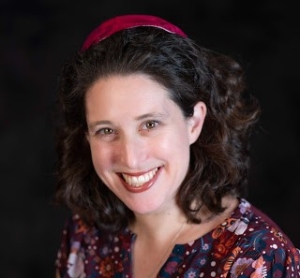
Rabbi Dara Lithwick, the lead builder at Builders Blog, is an advocate for LGBTQ2+ inclusion within diverse Jewish spaces and for Jewish inclusion in LGBTQ2+ spaces. When not at work as a constitutional and parliamentary affairs lawyer, Rabbi Dara is active as an outreach rabbi at Temple Israel Ottawa. She is a member of Bayit’s Board of Directors.

